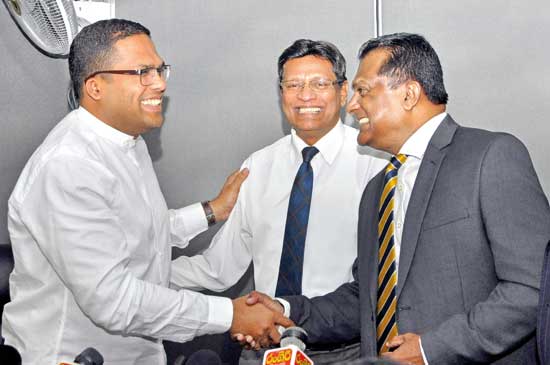Is SLC on the right path or merely a stronghold for power-hungry administrators?
Silva’s tenure has been defined by relentless power struggles, court battles, and high-stakes political manoeuvering, making SLC less of a sports administration and more of a battleground for personal and political agendas. His deep-rooted connections to the country’s political elite have allowed him to outmanoeuver opponents time and again, ensuring his control remains unchallenged.

His passage to a fourth term was facilitated by former Sports Minister Harin Fernando
His passage to a fourth term was facilitated by former Sports Minister Harin Fernando, who introduced changes to sports regulations allowing a president to hold office for eight years. Though these regulations have yet to be approved in parliament, a legal requirement, the current Sports Minister under the NPP government has turned a blind eye to this constitutional necessity, allowing Silva’s reign to continue unimpeded.
Silva first took the reins in 2019, stepping into an administration already engulfed in political interference—a hallmark of SLC since winning the World Cup in 1996. As cricket governance evolved into a lucrative enterprise, businessmen and political heavyweights scrambled for control, turning elections into fiercely contested affairs.
However, Silva’s tenure has taken this political entanglement to new heights. In 2019, backed by Thilanga Sumathipala—a powerful figure in cricket circles—Silva defeated businessman Jayantha Dharmadasa in a tightly contested election. Since then, he has remained elusive, barely facing any serious challengers at elections.
He even withstood a blindside move by then-Minister of Sports Roshan Ranasinghe to remove him and his committee. Minister Ranasinghe dissolved Silva’s administration in 2023 following Sri Lanka’s poor showing at the World Cup that year, appointing an interim committee to restore order. But the fallout was catastrophic—
Sri Lanka was slapped with an ICC suspension for government interference, forcing the relocation of the Under-19 Men’s World Cup scheduled for January 2024, costing the nation millions of dollars in direct and indirect revenue.
Silva fought back ruthlessly. He took his battle to the courts, overturned the decision, and ultimately outlasted his ministerial adversary. Ranasinghe was removed from office, while Silva emerged stronger than ever. The episode not only underscored his vice-like grip over SLC but also exposed the extent of political infighting that has plagued Sri Lankan cricket.
Silva’s ascension to the presidency of the Asian Cricket Council (ACC) in December 2024—succeeding India’s Jay Shah—further cemented his standing in international cricket governance, reinforcing his ability to maneuver through political corridors with precision. His appointment wasn’t just a victory for Sri Lanka; it was a testament to Silva’s ability to exploit power structures for personal consolidation.
SLC elections have always been notorious for their backroom dealings, with violence even erupting at times—as seen in the infamous 1998 AGM brawl involving security personnel of then-President Chandrika Bandaranaike Kumaratunga. However, Silva has managed to change this culture, ensuring that no one dares to challenge him or his team at elections. Such is his clout.
While Silva has consolidated power, Sri Lanka’s cricketing fortunes have steadily declined. Is he to blame? That remains debatable. But under his leadership since 2019, the men’s team has participated in five World Cups—two 50-over tournaments and three T20 editions—only to suffer humiliating first-round exits in all. The latest failure came with Sri Lanka’s inability to qualify for the 2025 ICC Champions Trophy, a damning indictment of the team’s decline under his administration.
Currently, Sri Lanka’s men’s team languishes at sixth in Tests, sixth in ODIs, and eighth in T20Is—a stark contrast to its past glory, when Sri Lanka rubbed shoulders with the best of the best. The only bright spot in Silva’s tenure has been Sri Lanka’s victories in both the Men’s and Women’s Asia Cups.
As Silva embarks on another term, his legacy is already written—one of relentless political manoeuvering, legal battles, and an administration more focused on consolidating power than uplifting Sri Lankan cricket. His ability to withstand political storms and outmaneuver rivals speaks to his tenacity, but it also raises a troubling question: Is Sri Lanka Cricket being run for the betterment of the sport, or merely as a stronghold for power-hungry administrators?


